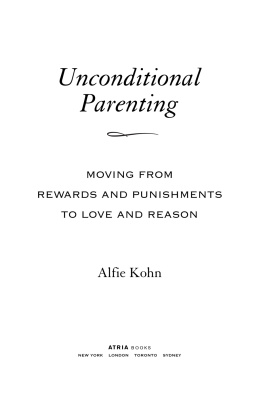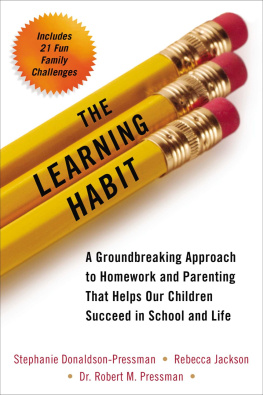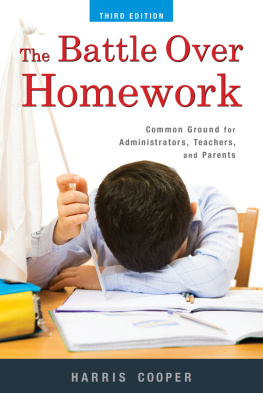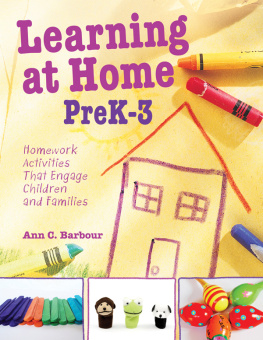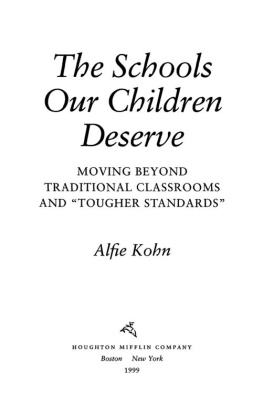THE HOMEWORK
MYTH
ALSO BY ALFIE KOHN
No Contest: The Case Against Competition
The Brighter Side of Human Nature:
Altruism and Empathy in Everyday Life
You Know What They Say... : The Truth About Popular Beliefs
Punished by Rewards: The Trouble with Gold Stars,
Incentive Plans, As, Praise, and Other Bribes
Beyond Discipline: From Compliance to Community
Education, Inc.: Turning Learning into a Business [editor]
What To Look For in a Classroom... And Other Essays
The Schools Our Children Deserve:
Moving Beyond Traditional Classrooms and Tougher Standards
The Case Against Standardized Testing:
Raising the Scores, Ruining the Schools
What Does It Mean to Be Well Educated?:
And More Essays on Standards, Grading, and Other Follies
Unconditional Parenting:
Moving from Rewards and Punishments to Love and Reason
THE HOMEWORK
MYTH
Why Our Kids Get
Too Much of a Bad Thing
ALFIE KOHN
Many of the designations used by manufacturers and sellers to distinguish
their products are claimed as trademarks. Where those designations
appear in this book and Da Capo Press was aware of a trademark claim,
the designations have been printed in initial capital letters.
Copyright 2006 by Alfie Kohn
All rights reserved. No part of this publication may be
reproduced, stored in a retrieval system, or transmitted, in any form
or by any means, electronic, mechanical, photocopying, recording, or
otherwise, without the prior written permission of the publisher.
Printed in the United States of America.
Set in 12 point Granjon by the Perseus Books Group
Cataloging-in-Publication data for this book is available
from the Library of Congress.
First Da Capo Press edition 2006
ISBN-10 0-7382-1085-4
ISBN-13 978-0-7382-1085-8
eBook ISBN: 9780738211343
Published by Da Capo Press
A Member of the Perseus Books Group
www.dacapopress.com
Da Capo Press books are available at special discounts for bulk
purchases in the U.S. by corporations, institutions, and other
organizations. For more information, please contact the Special Markets
Department at the Perseus Books Group, 11 Cambridge Center,
Cambridge, MA 02142, or call (800) 255-1514 or (617) 252-5298,
or e-mail .
1 2 3 4 5 6 7 8 909 08 07 06
PART I
The Truth
About
Homework
CHAPTER 1
Missing Out on
Their Childhoods
A FTER SPENDING MOST of the day in school, children are typically given additional assignments to be completed at home. This is a rather curious fact when you stop to think about it, but not as curious as the fact that few people ever stop to think about it. Its worth asking not only whether there are good reasons to support the nearly universal practice of assigning homework, but why that practice is so often taken for grantedeven by vast numbers of parents and teachers who are troubled by its impact on children.
The mystery deepens in light of the fact that widespread assumptions about the benefits of homeworkhigher achievement and the promotion of such virtues as self-discipline and responsibilityarent substantiated by the available evidence. As well see later, supporting data are either weak or nonexistent, depending on the specific outcome being investigated and the age of the students. But, again, this has rarely prompted serious discussion about the need for homework, nor has it quieted demands that even more be assigned.
Parents frequently talk about homework when they get together, and its one of the first subjects to come up when they meet with teachers, either individually or in group sessions. Theres no more reliable way to pack the house at a PTA meeting than to promise advice for dealing with homework woes. Likewise, theres a seemingly limitless demand for books that offer help, books with titles like: The Homework Solution: Getting Kids to Do Their Homework;Seven Steps to Homework Success; Homework Rules andHomework Tools; Ending the Homework Hassle; How to Help YourChild with Homework; Hassle Free Homework, and so on.
Clearly this is an issue of acute relevance to just about everyone whos involved with childrenand its one that leaves many of us feeling frustrated, confused, or even angry. But the assumption that homework should, even must, continue to be assigned despite our misgivings is rarely called into question.
This posture of basic acceptance would be understandable if most teachers decided from time to time that a certain lesson ought to continue after school was over, and therefore assigned students to read, write, figure out, or do something at home on those afternoons. We might have concerns about the specifics of certain assignments, but at least wed know that the teachers were exercising their judgment, deciding on a case-by-case basis whether circumstances really justified intruding on family timeand considering whether meaningful learning was likely to result.
That scenario, however, bears no relation to what happens in most American schools. Homework isnt limited to those times when it seems appropriate and important. Most teachers and administrators arent saying, It may be useful to do this particular project at home. Rather, the point of departure seems to be, Weve decided ahead of time that children will have to do something every night (or several times a week). Later on well figure out what to make them do. This commitment to the idea of homework in the abstract is accepted by the overwhelming major- ity of schoolspublic and private, elementary and secondary. Even many schools that see themselves as progressive have adopted homework policies specifying that children at a given grade level will be required to do a set number of minutes of some kind of schoolwork at home.
Has anyone spoken up to challenge this state of affairs? Consider the following passage from an article in Parents magazine:
If children are not required to learn useless and meaningless things, homework is entirely unnecessary for the learning of common school subjects. But when a school requires the amassing of many facts which have little or no significance to the child, learning is so slow and painful that the school is obliged to turn to the home for help out of the mess the school has created.
If youre a regular reader of Parents but dont recall coming across that provocative statement, it may be because the article appeared in the November 1937 issue.
Anyone who is dissatisfied with that sort of advice may feel a twinge of nostalgia for the pointed questioning and progressive thinking that were more common in the 1920s through the 1940s.
Sadly, it seems necessary today to make the same arguments and fight the same battles against the same practices and premises that Washburne and his colleagues faced. But that doesnt mean the supposed pendulum swings of educational philosophy are matched by changes in practice. With respect to schooling in general, progressive theory has periodically generated a surge of excitement among researchers and theorists but has never made serious inroads into most American classrooms. The phrase back to basics is a misnomer: We never really left.
With respect to homework in particular, its equally important to recognize that shifts in attitudes on the part of scholarsor even the public at largedont necessarily translate into significant variations in the amount of homework that students actually have to do. Its easy to confuse whats being discussed with whats being done. For example, a 1999 article in the




